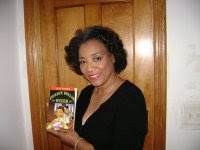She wants to be the country's first black president. She paints herself as an agent of change who will take on special interests. Eleven weeks before the primary, she trails a more-experienced opponent in the polls. Still, she hopes to build a broad base by reaching out to young people through the Internet.
Sound familiar?
People are calling Epsy Campbell the Barack Obama of Costa Rica. Campbell, a charismatic activist who recently announced a run for president, dismisses the comparison. But she said she has been deeply inspired by Obama. She attended the Democratic National Convention, closely followed the campaign and cried when Obama won.
''He broke the glass ceiling for African Americans and Afro-descendents in Latin America and around the world,'' she said.
Campbell would be the first president in Latin America and the Spanish-speaking Caribbean to identify themselves as black, said Tanya Hernandez, a professor at George Washington University Law School in Washington, D.C. Her campaign marks a milestone in a region where, according to historian George Reid Andrews, 22 percent of the population identifies as having African ancestry.
''Like Obama's election, [her win] would bring a great sense of hope to people,'' said Hernandez, who is familiar with Campbell's work. ``It may be just one person, but it's a vision we never thought we'd see.''
LOFTY GOALS
Campbell, whose grandparents and great grandparents immigrated to Costa Rica from Jamaica in the early 1900s, is an active member of the left-leaning Citizen Action Party (PAC), the most powerful opposition party in Costa Rica. In 2006, she ran for vice president on a ticket with party founder Ottón Solís. They lost by one percentage point.
Campbell now plans to challenge Solís in the party's primary on May 31. Like Obama, she has vowed to fight for justice and opportunity, for better schools, jobs and healthcare. She has promised to work with ideological foes to build consensus and tackle national problems.
''The traditional political class remains anchored to the past, polarizing us rather than seeking dialogue, responding to special interests rather than seeking agreement,'' she said at a Feb. 16 news conference announcing her run. ``It is time to inspire people, to tap into the energy that will generate change in this country.''
In an echo of one of Obama's favorite phrases, she added, 'The most important word must not be `I,' but 'we,' the people.''
A prolific writer and speaker, Campbell has worked as an international consultant on race and gender issues, and she was coordinator of the Network of Afro-Latin American and Afro-Caribbean Women from 1997 to 2001.
She said Costa Rica's racial and ethnic diversity merits greater recognition. But in a country where just 2 percent of the population identifies itself black, Campbell appears to be moving beyond racial politics, just as Obama did.
''Let's talk about my ideas and the vision I have,'' she said in response to a question about race. ``Let's see each other as equals, like the human beings we are.''
Campbell is 45, the same age as Obama when he announced his candidacy. Like Obama, she is seeking to reach out to young voters through a broad Internet campaign.
Campbell hosted two online chats last month, and she posts frequently on the social networking websites Facebook and Twitter. Just as Obama promised to reveal his vice presidential pick first to those who signed up for his text-messaging alerts, so Campbell's Facebook friends were first to learn about her run for president.
''Because you were the first to support me, I want you to be the first to hear the news,'' she wrote in a Facebook message minutes before announcing her candidacy.
Cristian Cambronero, a 28-year-old blogger who is coordinating Campbell's Internet strategy, is wary about comparing the two leaders. Still, he said he was inspired by Obama's campaign.
''Obama did not merely have a presence on the Internet; he encouraged people to actively participate,'' Cambronero said. ``No one can ignore that example.''
Even Campbell's challenges echo Obama's. Like Obama, Campbell's national political experience is limited to a four-year term in the legislature.
Solís, in addition to serving as lawmaker, was Planning Minister, a board member of the Central Bank and a two-time presidential candidate. Solís' supporters say he would be better able to guide Costa Rica through a global financial crisis.
''This is an airplane in the middle of a big storm. We need very good pilots,'' said political analyst Rodolfo Cerdas. ``Epsy still has to mature politically.''
GROUND TO GAIN
Campbell trailed Solís by 56 percentage points in a CID-Gallup poll of party stalwarts in January, before she announced her candidacy. Still, the same poll showed the two candidates tied among the general voting public. In the coming weeks, Campbell said, she will encourage thousands of new voters to register with PAC. She will hold town-hall style meetings throughout the country, she said, and solicit small contributions from ``everyday folks.''
''Our movement . . . will launch a registration campaign like our country has never seen before,'' she said.
Campbell rejects the idea that she is merely emulating Obama. She points out that she became active in politics eight years ago, long before Obama became an international celebrity.
But, she said, she has learned from his example and identifies with his vision. In a blog post the day after the November elections, Campbell suggested she would follow Obama's lead.
''I promise to do my part, because it will take many Obamas, men and women, to eliminate injustice,'' she wrote.
''Epsy is the Costa Rican Obama,'' a man named José blogged in response. ``Let's go! Yes we can!''

No comments:
Post a Comment